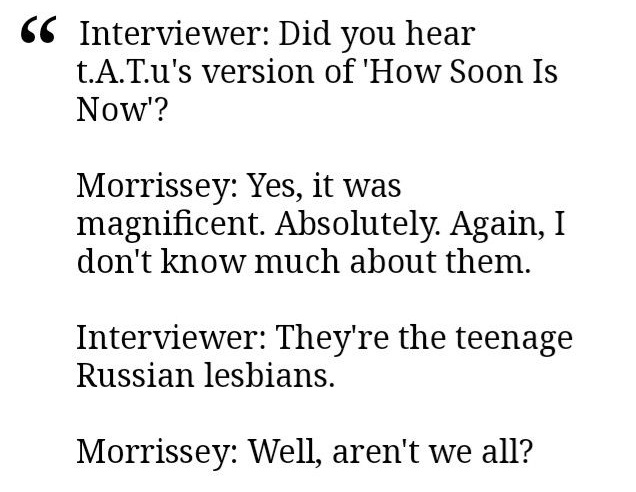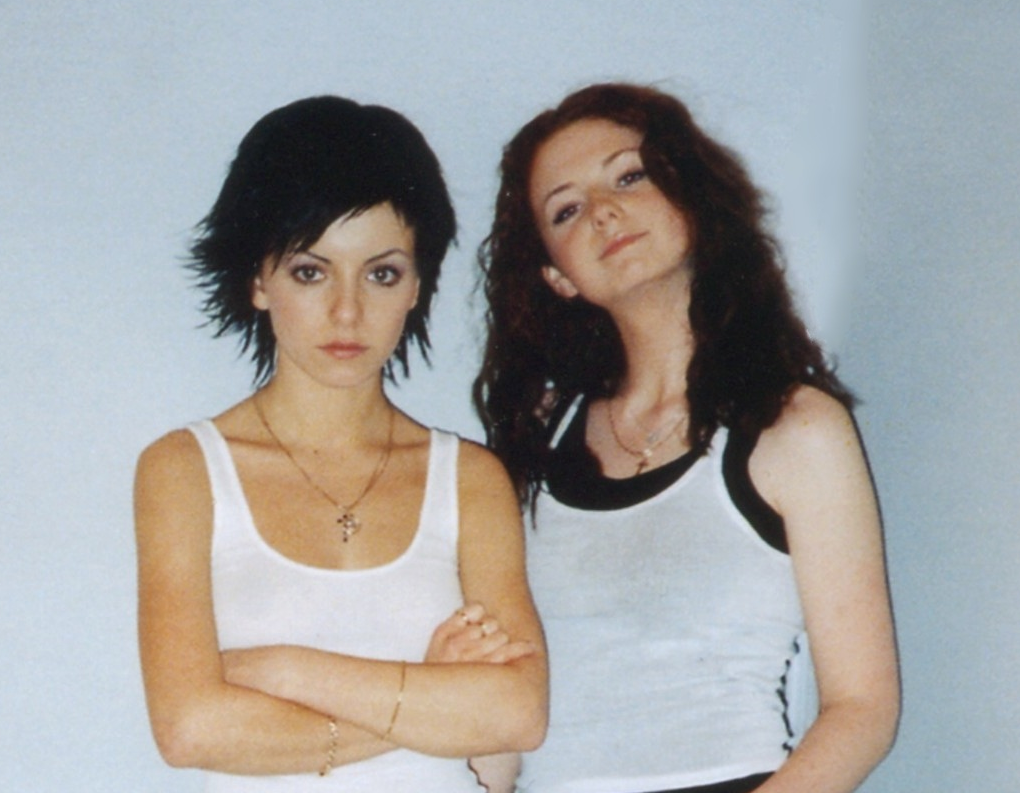My discovery of this strange story begins with Morrissey.
One day, scrolling through twitter, I came across a screenshot of an interview with the prolific frontman of The Smiths.

Well, aren’t we all?
Aside from the inherent comedy of Morrissey’s confusing statement, the phrase teenage Russian lesbians piqued my interest.
I went immediately and listened to their cover of “How Soon Is Now?” — which is fantastic and full of energy — and then realized that they were behind the hit song “All The Things She Said.”
The latter track, which boasts an impressive 500 million streams on Spotify, is an early 2000’s anthem with an accompanying video that features highly specific indie sleaze and Eurotrash aesthetics. The two girls, Julia Volkova and Lena Katina, stand in the rain dressed in schoolgirl outfits, huddling together as they sing with incredible yearning, “this is not enough.”
The video is obviously not straight. The girls kiss as the camera is obscured by an oppressive downpour, running alongside each other across prison bars with a crowd of people in umbrellas watching on.
In an article from Pedestrian, author Louis Hanson called it “The queer anthem of all queer anthems, I’d come to remember the track.”
And Hanson is not alone. Browsing the internet, it seems that a large portion of their audience remembers being fixated on this song at very young ages for reasons they weren’t quite sure of yet, or were all-too-sure of. Almost all of the YouTube comments for the video are tongue-in-cheek references to what good friends they seem to be.
It turns out that there were no implicit meanings, and the girls were actually just good friends.
The management team behind t.A.T.u had created the air of lesbianism to drive sales and create an edgier look for the duo. Katina stated later on that “I looked at it as my role… like a movie…I never was a lesbian. I never was attracted to a girl. I never had that.”
Volkova even outed herself as homophobic in the last ten years, expressing on a Russian talk show in 2014 about how she would not “accept a gay son,” and how “lesbians look aesthetically much nicer than two men holding their hands or kissing.”
So, that’s all that “All The Things She Said” turned out to be: a highly curated song and video that was meant to look aesthetically pleasing without any authenticity whatsoever.
Clearly, this is not only insidious, but deeply harmful. LGBTQ+ people, specifically young people, deserve media that speaks to them that is not exploitative. It shouldn’t need to be said that being gay is not an aesthetic and should not be treated as such.
However, despite being a falsified song, “All The Things She Said,” had lasting impacts in the girl’s home country of Russia.
Luke Winkie writes about Russia’s violent history towards queer people and how the girl group inadvertently served as advocates for many people to familiarize themselves with gay culture. Winkie cites other queer-coded Russian pop culture figures, such as Boris Moiseev, expressing that, “as repressive as the Putin hegemony tends to be, queerness leaks out in the Muscovy arts.”
In the article, Winkie also highlights Russian youth who came to important self-realizations through t.A.T.u’s music. Hristina Zarembo, a Russian non-binary musician, spoke on the fact that the group had a “seismic impact the group had on their parents,” who had never been allowed to reflect on such themes.
The artist Polina Titova is featured as well, remembering that “When I realized I like girls, I was crying in the bathroom, singing ‘All the Things She Said’.” She later elaborates on how Volkova and Katina gave her the permission and space to explore her sexuality during her teenage years.
Even though the aftermath of t.A.T.u’s hit single managed to have a positive spin, queerbaiting is still a large issue in the music industry today.
Artists such as Harry Styles, Timothee Chalamet, Taylor Swift, Billie Eilish and Kali Uchis have all been accused of trying to pass as gay in order to draw a wider audience.
In 2019, Taylor Swift released the track “You Need To Calm Down,” which portrayed herself as a hero for LGBTQ+ rights. On-the-nose and pandering lyrics like “Why are you mad? / When you could be GLAAD? (You could be GLAAD),” immediately garnered critiques for her shallow association with a culture she is not a part of.
Further, fan conspiracies relating to her alleged relationship with model Karlie Kloss have been going on for years, with fans speculating that they have been secretly dating. The song only boosted these theories. As a historically marginalized and underrepresented group, it only makes sense that LGBTQ+ people would look to have idols who reflect their experiences. Swift seemed to lean into this, obviously exploiting her audience, although whether she is aware of the conspiracies is unknown.
The history of queerbaiting and pandering to an audience that is starving for representation is shocking. It is lucky that in the case of t.A.T.u, positive impacts were able to come about, and several young people were able to more fully explore and understand their own identities, despite the truth of the catalyst. Their success can be examined now as a warning for the importance of media literacy, and the importance of sincere art that reflects real-life experiences.
Today, there are several queer artists like Chapell Roan, Ethel Cain, Arlo Parks, Doechii and SOPHIE whose popularity is skyrocketing. The best thing for the future of queer art is to continue to support these musicians and make sure that future generations have access to safe, honest communities to discover themselves and be supported.

